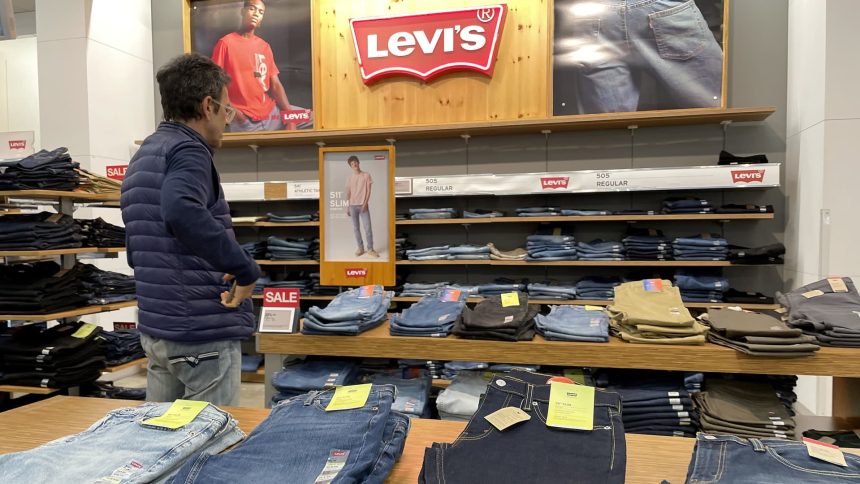Denim-crazed consumers are turning to Levi Strauss & Co for new jeans, but the company’s overall business is being dragged down by its Dockers brand, which the company is now considering selling off, it announced Wednesday.
Sales at Levi’s brand were up 5% during its fiscal third quarter — the biggest gain in two years — but overall revenue came in flat and lower than Wall Street had expected.
Shares of Levi’s fell more than 8% in extended trading Wednesday.
Here’s how the denim-maker performed compared with what Wall Street was anticipating, based on a survey of analysts by LSEG:
- Earnings per share: 33 cents adjusted vs. 31 cents expected
- Revenue: $1.52 billion vs. $1.55 billion expected
The company’s reported net income for the three-month period that ended Aug. 25 was $20.7 million, or 5 cents per share, compared with $9.6 million, or 2 cents per share, a year earlier. Excluding one-time items, Levi’s posted earnings of $132 million, or 33 cents per share.
Sales came in at $1.52 billion, up slightly from $1.51 billion a year earlier.
With one quarter left to go in the fiscal year, Levi reaffirmed its full year adjusted earnings per share guidance of $1.17 to $1.27, in line with expectations of $1.25, according to LSEG.
It narrowed its revenue guidance and is now expecting sales to grow 1%, compared to a previous range of between 1% and 3%.
Levi’s, which owns its namesake brand, as well as Dockers and Beyond Yoga, would have printed quite a different set of results had it not been for Dockers. It started that brand in 1986 to offer consumers an alternative to denim: khakis.
Throughout the 1990s and 2000s, khakis were a mainstay in most consumers’ closets but these days, it has fallen out of fashion. The efforts that Levi’s has made to differentiate Dockers led to too much overlap with the Levi’s brand, which has expanded into a lifestyle brand that offers a lot more products than jeans.
During the quarter, sales at Dockers were down 15% to $73.7 million while Beyond Yoga, the buzzy athleisure brand it acquired in 2021, saw sales grow 19% to $32.2 million.
“Over the last couple of years, the brand has underperformed. … We felt this was the right decision for the long term. Our view financially is the exit of Dockers will improve the company’s overall margins and also minimize volatility in top line growth,” Levi’s finance chief Harmit Singh told CNBC in an interview. “We believe the exit of Dockers will allow both Dockers and Levi’s to independently operate and maximize each other’s value independently.”
Levi’s has tapped Bank of America to lead the sale process.
Beyond Docker’s, Levi’s is making gains in growing its profitability as it continues to shift its focus to selling directly to consumers.
During the quarter, its gross margin rose by 4.4 percentage points, which Singh attributed to the direct-selling strategy, lower cotton costs and better products that didn’t need to be marked down to be sold.
Sales in Levi’s Europe business came in higher than expected at $406.6 million, ahead of StreetAccount estimates of $392 million, but sales in the Americas and Asia came in lower. Levi’s posted $757.2 million in sales in the Americas, below the the $789.2 million that StreetAccount analysts had expected. In Asia, Levi’s saw revenue of $247.1 million, below StreetAccount estimates of $258 million.
Read the full article here




